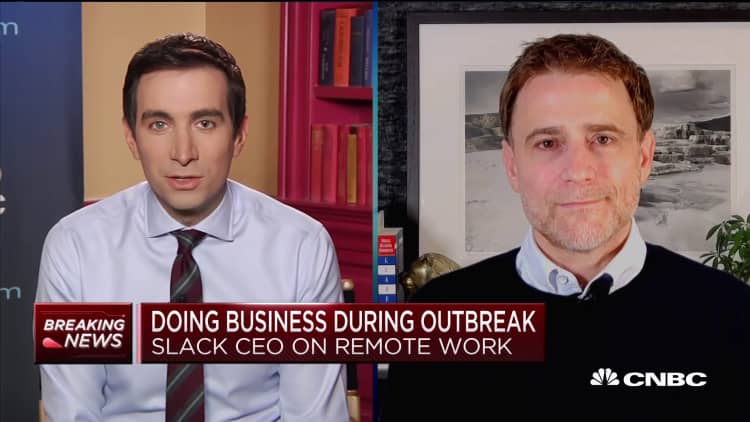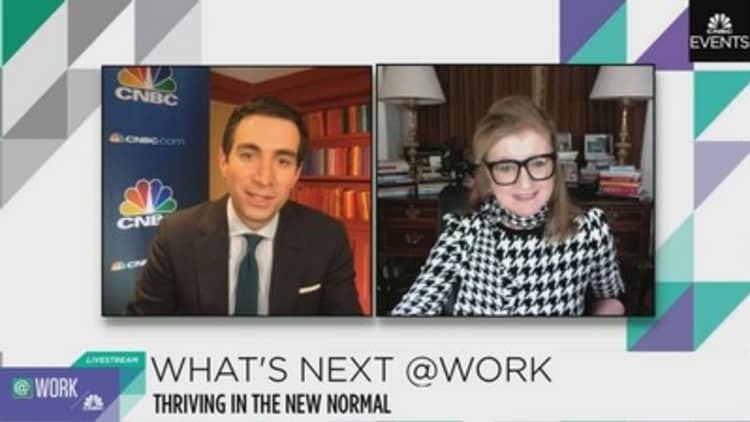Back in January, Diane Gherson, chief human resources officer at IBM, thought the biggest challenge she would face with the coronavirus would be how to protect employees as they attended industry trade shows and conferences over the coming months. "My chief medical officer and I reviewed the precautions from the experts about how to screen people who were going to these events and why there needed to be a no-handshake policy," she says. "It all feels very quaint now, and so long ago."
Indeed, as the weeks unfolded and news of the increasing number of people infected with the virus in the U.S. began making headlines, she knew IBM's response needed to be strong and swift. Adding to the complexity of the task was the fact that Arvind Krishna, a 30-year veteran of the tech giant, was taking over as CEO on April 6.
In the weeks before that, and each day since, Gherson has conducted an hour-long virtual meeting every morning with her team. During it she reviews the concerns and challenges of managers and employees and plans the support and resilience offerings IBM is making available to all 350,000 of its global employees. She then takes these findings and recommendations into her twice-weekly meetings with the entire senior leadership team, including the new CEO.
It was during these conversations that Gherson helped craft and lead IBM's work-from-home transition. "When we saw it hit 100 cases in New York, we decided to send everyone home in the New York vicinity," she explains. Not long after that, the tech giant close d down all its offices in the U.S. and abroad.

Today about 95% of IBM's employees are working from home. The move involved hundreds of data centers being operated remotely, and the rapid-fire training of leaders to understand their new responsibilities to connect with their people in this drastically changed environment. So far, the company hasn't laid off any workers. "We're a strong company and have a strong balance sheet, but what will unfold for us is largely unknown," Gherson says.
In the meantime, she's helping IBM begin the planning for when its people can return to work. Among the questions Gherson is discussing with the CEO and other senior leaders: Who comes into the buildings? How many people are allowed in an elevator at one time? How does the company configure floor plans to keep people far enough apart from each other so they feel safe?
"We're in 175 countries, and we have a lot of buildings, so this isn't an easy thing to do," Gherson says. "But we have to start these conversations now so we can figure it out and be ready."
During this time of major upheaval and uncertainty, the CHRO is a loud voice in the coronavirus war room. These chief people officers are the ones having daily, if not hourly, conversations with the CEO and other senior leaders on how best to navigate a situation that no one possibly could have fathomed. They're the ones helping to keep anxiety-ridden employees informed about what's happening with the company and up to date on the resources — financial and medical — that can help them stay calm and productive.
And as organizations begin the early discussions about when employees might be able to return to work, it's the CHRO's job to help create a blueprint for what that might look like. In short, they're therapists, benefits counselors and strategists.
"In the earliest days, we thought [coronavirus] was strictly a health-care issue," says Johnny C. Taylor Jr., CEO of the Society for Human Resource Management. "But it became clear how quickly it morphed into a people issue and how CHROs are playing a critical role in helping their companies get through this."
And while plenty of companies may have had disaster plans in place, nearly all of the CHROs we spoke to said nothing could have prepared for the magnitude of this pandemic. Tamla Oates-Forney, CHRO of Waste Management, was the head of HR for GE Africa for five years and dealt with the Ebola crisis there. "The coronavirus is so much broader, is moving so much faster and is impacting so many more people," she says.
Industries hard hit
The industries having the hardest times, of course, are the ones for whom remote work isn't possible. Airlines, hotels, cruise lines, entertainment companies, brick-and-mortar retailers and restaurants have all seen their businesses vanish in a matter of weeks.
David Hanrahan, the CHRO of Eventbrite, the event management and ticketing platform based in San Francisco, says his company has been "massively disrupted" because of the coronavirus. "Our business is live events, and those simply aren't taking place right now," he says, adding that all of the company's employees are working remotely, trying to figure out how to stay focused and calm.
"We're not talking to them about productivity, because I don't think that would land very well in this environment," he says. In fact, shortly after this interview, Eventbrite had to lay off 45% of its workforce.
In the earliest days, we thought [coronavirus] was strictly a health-care issue. But it became clear how quickly it morphed into a people issue and how CHROs are playing a critical role in helping their companies get through thisJohnny C. Taylor Jr.CEO of Society for Human Resource Management
One of the biggest challenges CHROs face during this crisis is maintaining employee morale and helping them manage mounting levels of stress and anxiety. Working from home with a spouse doing the same, while also trying to help kids with online classes, is a recipe for stress and mental exhaustion.
Thrive Global, the company started by Arianna Huffington to help organizations make the connection between employee well-being and performance, found in a recent survey that 80% of its respondents reported more general stress and anxiety as a result of the outbreak. More than 85% are worried that the pandemic will impact their ability to work.

Ellyn Shook, CHRO at professional services giant Accenture, says she's paying special attention to employees' emotional well-being. Right before the crisis, the company launched a program with Thrive Global called "Thriving Minds," which reinforces Accenture's belief that mental wellness is tied to productivity. The program provides coping strategies for dealing with anxiety, stress and loneliness. As the crisis unfolded, Shook says Thrive Global was able to rapidly reconfigure the 90-minute course into bite-size chunks so that employees could access it in real time, when they need it.
Managing that program and the other resources and outreach needed during this crisis has been a massive undertaking, Shook says. Before the crisis, she met with Accenture's leadership team in person once per quarter. Now she's part of a virtual meeting every morning for an hour, designed to get the roundup of what's happening around the globe with clients, people and operations. "We want to make sure we're in sync and that our efforts are going toward the things that need immediate attention," she says.
Hanrahan of Eventbrite says the company's Modern Health offering, a digital platform geared to address stress, anxiety and other mental well-being issues, has seen a "massive uptick" in usage over the past few weeks. Webinars around topics like managing isolation and loneliness and maintaining a healthy lifestyle during stressful times are also getting a lot of attention from home-bound employees.
Worry over layoffs
Employee anxiety over potential layoffs is another worry that CHROs are now addressing. "We're telling CHROs to dole out as much truth as employees can reasonably handle," says Taylor of SHRM. He recalls speaking recently with the CHRO of a Fortune 500 company who told him that it was likely his firm was going to have to cut 10% of its workforce permanently — even after the crisis resolved.
"Giving employees that information now is just going to create hysteria because everyone is going to be trying to figure out if they're in the 10%," he says. "The best course of action is to deal with what's going on today and in the near future."
Oates-Forney of Waste Management says her company announced in the early days of the crisis that it would guarantee 40 hours of pay each week for its thousands of hourly workers even if they work fewer hours because of the pandemic. "We were trying to take as many unknowns off the table at a time when people are really anxious," she says.
In the meantime, Gherson and other CHROs are finding that it's important they follow the same guidance they're doling out to employees who feel anxious and overwhelmed about all that is happening. Shook from Accenture takes a break at 6 p.m. each day to walk for three or four miles to clear her head. Gherson is getting outside each day to tend to her garden. Hanrahan is spending time reading to the children of Eventbrite's employees, and Oates-Forney is doing virtual workouts each day and connecting with her HR team with a virtual "Tea with Tamla" meeting each Friday at 2 p.m.
As these and other CHROs manage the daily onslaught of issues that will arise from this crisis in the weeks and months ahead, they'll continue to experience the pros and cons that this new visibility has given their role within their organizations.
"For years human resources professionals have wanted a seat at the proverbial table," says Taylor. "Now they have that seat in a major way. And if you're good, you're going to stand out. But if you're not good, you're going to stand out even more. We're going to see this crisis as a make-or-break time for a lot of CHROs."






